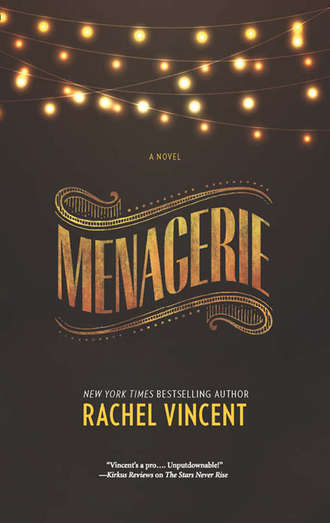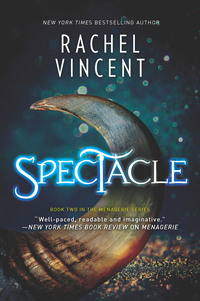
Полная версия
Menagerie
Delilah peered into the pen and discovered the source of the mystery. Three forms sat at the back in a semicircle, facing away from the crowd. The one on the left was the smallest and the one on the right was the largest, but all three wore what seemed to be threadbare nightgowns. Without their faces visible, their species was a total mystery.
“I say they’re cyclopses,” Matt declared.
Delilah shook her head. “Cyclopses are giants.”
“Actually, there’s a pygmy species native to a small island near Greece.” Neal Grundidge pulled a used tissue from his pocket and swiped at his runny nose. “They’re people-sized.”
“They could be satyrs,” Elías said. “We can’t see their feet from here.”
“Hey!” Matt shouted, gripping the pen with both hands. “Hey, turn around! We paid for freaks, so show us some freaks!”
“This field trip is free,” Shelley reminded him, but Matt only wedged one sneakered foot into the pen and climbed up a foot.
“Get down!” Delilah whispered fiercely, as the nanny started toward them with clenched fists and narrowed eyes. “You’re going to get us all in trouble.”
“We’re not leaving until you turn around, freaks!” Matt shouted, propelling himself another foot up the six-foot fence.
The creatures on the right and left of the semicircle hunched even closer to the center, but the one in the middle slowly began to turn.
Delilah held her breath, and Matt dropped onto the ground but clutched the fence with both hands. All six of the classmates watched, spellbound, as the form in the middle stood on human legs and feet and turned to face them. Long dark hair hung over her face, obscuring the source of her monstrosity, and silence fell over the fifth graders as they waited, frozen.
Finally the girl in the dress lifted one human-looking hand and pushed her hair back to reveal...
A perfectly normal-looking little girl.
“Awww!” Neal frowned. “She looks like my little sister.”
“What is she?” Elías asked, as the nanny approached.
“She’s not a she, she’s an it,” Matt insisted, backing solemnly away from the pen. “That’s the most dangerous kind of freak. The kind that looks like us. She must be a surrogate.”
“Are those her sisters?” Neal asked. “Surrogates don’t have brothers and sisters.”
“She’s an oracle,” the nanny said. “All three of them are. Right now they mostly find lost things and guess your middle name, but someday, they’ll be able to see the future.”
“You think they’ll see another reaping?” Shelley whispered.
Delilah hardly heard her best friend’s question. When her classmates had bored of the normal-looking freak and moved on to eat their lunch, Delilah stood alone in front of the pen, staring at the child oracle, who stared right back at her through haunting golden-brown eyes. The girl was a couple of years younger than Delilah, and a lot skinnier. Her nightgown was stained. Her hair was tangled and dirty, her bare feet caked in mud. There was no food in the oracles’ pen, nor any furniture at all.
When Delilah finally turned away from the girl on the other side of the fence, bothered by something she couldn’t quite put into words, she could feel the oracle watching as she walked all the way back to her table and sat with her friends. That unseen gaze followed her as she pulled a sandwich from her brown bag and stared at it, suffering a sudden loss of appetite.
Finally, as she opened her carton of milk, Delilah’s grim tangle of thoughts cleared enough for one to shine through. If that girl was a monster, anyone could be a monster. That’s why the world was so terrified of another reaping. Because just like last time, humanity would never see it coming.
But if monsters could look like humans, and humans could look like monsters, how could anyone ever really be sure that the right people stood on the outside of all those cages?
“Three hundred one thousand babies were born in hospitals across the United States in March of 1980. Not one of them made it home from the hospital.”
—Opening lines of a 1996 documentary entitled
The Reaping—America’s Greatest Tragedy
Rommily
A bead of sweat rolled down Rommily’s brow and soaked into the thin blanket beneath her head. In midsummer, the inside of the cargo trailer was always sweltering, and being accustomed to the dark and the heat and the relentless jostling from the road wasn’t the same as being comfortable. But then, comfort wasn’t a concept she remembered very well anyway. She’d been sold to the menagerie as a skinny six-year-old with wide honey-brown eyes, clinging to her older sister’s hand while she whispered reassurances into her younger sister’s ear.
At twenty, Rommily was still thin and her eyes were still wide and honey brown, but the rest of her was all grown-up.
For the past decade of their fourteen years in captivity the oracles had shared a single cage on wheels, just wide enough to let them sleep side by side and just tall enough to stand up in. Rommily’s entire world consisted of 192 cubic feet of space, which she shared with her sisters. What little time they didn’t spend staring out at the world through steel mesh was spent performing, in chains.
Rommily could recall little of her life before the menagerie, and what memories she still possessed had taken on the hazy quality of a half-remembered dream.
The overloaded semi rolled to a stop with a familiar groan and the harsh squeal of brakes, and her body rocked with the motion. Near the front of the trailer, the pup whined in her cage, and at the rear one of the cats snorted, startled from sleep by the sudden loss of forward momentum.
The cats, she knew, always dreamed of trees, of wind and earth and prey. The pup dreamed about her mother. Rommily remembered their dreams clearly, though she hadn’t been able to peek into them in months.
She sat up on the threadbare quilt that served as her pallet in the summer and her blanket in the cold. She glanced at the sister on her left, then at the sister on her right, both still asleep in spite of the narrow empty space she had left between them. She could hardly see them in the muddy darkness, but she knew their shapes by heart.
On the left was Lala, with her perpetual baby face and thin frame, dirty toes peeking from beneath her long layered skirt, even with her legs curled up to her chest. Lala was the youngest of the three, and the smartest, according to most.
On the right was Mirela, whose bountiful figure endured, though she was fed no more than the rest of the livestock. Mirela had a spine of steel, a fact evident in her proud posture. Mirie would not bend. Not for food, not for sleep, and not for comfort. Deep down, her sisters understood that if she were ever pushed too hard, she would snap, and the recoil might kill them all.
There wasn’t enough room to move around in the steel crate, so Rommily sat with her knees tucked up to her chest and stared into the cage across the narrow aisle that ran down the center of the cargo trailer. A set of eyes flashed in the dark, reflecting what little light filtered through the vents in the top of the wide-load trailer.
The minotaur was awake. If he ever slept, Rommily couldn’t tell. Every time she woke up on the road, the bull was watching her. Not just looking at her. Watching her. She wasn’t sure of much anymore, but she was sure of that.
The rumble of the engine died, and in its absence voices echoed from outside, shouting orders and barking replies. Rommily couldn’t tell what time it was from the muddy light overhead, but the time of day never mattered anyway. Regardless of the hour or the weather, the roustabouts would start setting everything up the moment they arrived at the site, the latest in an endless blur of rural county fairgrounds. Lost time was lost money, and if there was anything old man Metzger wasn’t willing to lose, it was money.
Something scraped the outside of the cargo trailer, and Lala rolled over in her sleep. Metal creaked from the left and right as the other livestock began to stir in their cages. The acrid scent of fresh urine wafted from the front of the trailer and Rommily’s nose crinkled. Someone’s bladder control had failed. Probably the pup’s. But that was no surprise, considering how long they’d been locked in the dark.
A sudden violent squeal of metal ripped through the voices echoing from outside, and Rommily’s eyelids snapped shut as mental images rolled over her. Visions still came like that sometimes, triggered from deep within her by a sight, scent, or sound.
“Take the key and lock her up,” she mumbled.
The bull’s eyes narrowed as his attention to Rommily intensified, but she didn’t notice. She could no longer see anything but what played in her head, and even if she actually understood what she saw this time, no one else ever would. They hadn’t been able to make much sense of anything she’d said since the rainy night they’d found her wandering between the cages on some Midwestern fairgrounds, drenched to the bone and dripping with enough blood to drive the cats into a frenzy.
Rommily knew that she understood more of the world than it understood of her since that night, but that frustrated her much less than the brutal realignment of her divination. Her third eye saw mostly the end of life now, and each vision chipped away a little more of her sanity. Mirela worried that she was too far gone already. Rommily worried that Mirela was right.
“Jack fell down and broke his crown,” she whispered, and the words ran together like watercolors on canvas.
On her right, Mirela sat up, took one look at Rommily, then shoved her other sister’s shoulder. Lala groaned and opened her eyes, ready to grump, but when her gaze fell on Rommily, the words died on her tongue.
Before either of them could try for the thousandth time to interpret their sister’s words, the mighty groan of steel obliterated any attempt at communication. A second later, their cage began to tremble as the floor of the trailer shuddered beneath it.
The trailer wall behind the bull’s cage separated from the ceiling with a great creak. Harsh daylight poured in through the ever-widening seams at the top of the wall and down both sides, blinding the occupants inside as the wall, hinged at the bottom, folded down like a ramp the full length of the trailer.
The effect was like opening one long side of a box to reveal its contents. Anyone unaccustomed to the sight would have been astonished by the number of wheeled cages lined up inside, neat as a child’s blocks put away for storage.
But Rommily and her sisters, and the pup, and the cats, and all the others—they only stared out at the circus unfolding before them with tired, glazed eyes.
The bull didn’t turn to look, not even when several big roustabouts in dusty jeans and matching red shirts climbed the ramp at his back. Their heavy boots clomped against the metal floor, and they began opening locks and pulling heavy iron chains from the axles beneath the bull’s cage.
The minotaur was bigger than all three of the oracles combined, and it took eight men—all of them big and strong, and accustomed to the work—to control the roll of his cage down the ramp. If left to gravity, his cart would crash heavily into whatever blocked its path, and if there was anything old man Metzger liked less than wasted time or lost money, it was broken equipment.
While several of the roustabouts stayed behind to sedate the bull, then let him out of his pen and fit him with a work harness, the others climbed the ramp again to fetch the horse cages. The centaurs couldn’t bear a load like the minotaur, but all beasts of burden would be put to heavy labor of one sort or another.
To keep them healthy enough to work, they were given extra food.
To keep them relatively safe to work with, they were given regular sedatives, which kept their minds dull.
Rommily watched as the minotaur was harnessed, leather straps fitting over his largely bovine head and massive, heavy horns before lying across enormous cords of human neck muscle. He blinked at her through a medicated daze. His attention didn’t falter even when the lot superintendent started shouting orders and waving his arms, directing carts of brightly colored costumes and decorative wagon casings—huge hand-carved frames, which would be mounted on the sides of the cages when they went on display.
Mirela and Lala sat on their knees on either side of their sister, and together they watched the pre-carnival dance, a laborious routine they knew well. Everyone had a job. Every job was important. The last time someone forgot to double-check a lock, three people had died. Four, if you count the creature that got loose.
But no one ever counted him.
The beasts of burden were put to work unloading the other cages. The oracles watched, mute, as pairs of large men hauled huge posts toward the fairgrounds. Women drove tractors pulling carts full of supplies, hay, and feed.
Rommily’s fingers folded around the steel mesh in front of her when the roustabouts came for her cage. The animal exhibits had been unloaded and all that remained were the specialized-service acts. The succubi. The sirens. The oracles. Soon they would be cleaned up, decked out in bright colors, and acclaimed on the midway as dancers, singers, and fortune-tellers. But that was all for show. For profit. For later.
For now...
The rattle of chains and the metallic screech of wheeled cages. Sweat-stained clothes and growling bellies, and the aged stench of travel.
The oracle sisters rocked with the jostle of the cage as they were rolled off the trailer. They squinted against the harsh sunlight. Rommily breathed deeply in the open air, but even outside the stale livestock trailer, the menagerie still smelled like captivity. Like straw and animals and sweat and manure. Like rust, oil, and exhaust.
The bull passed the oracles’ cage pulling two of the wolves’ pens, linked end to end. His gaze caught on Rommily again, and he veered so sharply that the man pulling his harness turned and beat him over the head with a thick baton. Rommily could only watch, and when the small procession had gone, her focus fell on a sign revealed by its passing.
Welcome to the Franklin County Fairgrounds.
Rommily shook her head, and her grip on the steel mesh tightened. When she opened her mouth, the commotion of the menagerie swallowed her voice before even her sisters could hear it. But the words echoed in her own head long after they fell from her tongue.
“...we all fall down...”
Delilah
On the morning of my twenty-fifth birthday, I woke up to find that Brandon had left four glossy red tickets on my nightstand. They were made from nice card stock—definitely keepsake quality—covered in glittering, scrolling black script. My hand shook as I picked them up. I knew what they were before I even read the print.
Admission For One
To Metzger’s Menagerie
The Largest Traveling Zoo
In The Northern Hemisphere
I left the tickets in the glove box during my shift at the bank, where I spent most of the day trying to tune out the excited chatter of my fellow tellers. About half of my coworkers also had tickets. The other half couldn’t afford to go.
Nothing pays very well in small-town Oklahoma, and usually that’s okay, because there isn’t much to do in the land of red earth anyway, until you get up to the capital or out toward Tulsa. Hell, you can’t even get full-strength beer with your dinner unless you pay for an import.
But the menagerie hadn’t been within driving distance of Franklin County in nearly fifteen years, and it might never come back. Everyone who could borrow money or call in a debt would be there to see the spectacle.
Including me.
Brandon had spent a fortune on the tickets, and it didn’t really matter that I would rather drive to the city and spend my birthday at the ballet, or a concert, or even a baseball game. As my mother had told me all my life, the true gift was in the intent, and my boyfriend had meant well.
He always meant well.
That evening, Brandon took my hand as we wandered down the fairground midway behind my best friend, Shelley Wells, and her boyfriend, Rick. Barkers cried out from both sides of the path, challenging us to pin the tail on the centaur, or knock down pop-up silhouettes of satyrs with a rubber-tipped archery set, or shoot the shell bras off mermaid figurines with water guns. Calliope music played at a volume only small children and the near-deaf could actually enjoy.
The noise scattered my thoughts and scraped my nerves raw. We hadn’t even gotten to the menagerie section of the carnival yet and I was ready to go home.
“Hey, Lilah, did you see they have a minotaur?” Shelley pointed to a twenties-style poster tacked up next to a spinning ride advertised as “guaranteed to make you hurl.”
“They didn’t have him when we were kids.”
I nodded, and she turned to walk backward, facing me while she shouted above the jostling, buzzing crowd. “You see a minotaur in school?”
“No. They’re pretty rare.” We’d seen very few live cryptids in class, and minotaurs were among the least likely to ever be studied by undergrads. They bred slowly in captivity and gave birth to only one offspring at a time. Most experts believed they’d be extinct within a century—a tragedy few in the U.S. would recognize.
“You shouldn’t have quit.” Shelley turned to face forward again, taking Rick’s arm, then called to me over her shoulder. “You would’ve been a great crypto-vet.”
“I didn’t quit. I just didn’t go to grad school.” For a while, though, that had been the plan. I’d finished my crypto-biology degree and had already been accepted into two crypto-veterinary programs before I’d realized that the only jobs legally available in the U.S. for crypto-vets would have required me to lock up my patients. Even the ones with human faces.
Those jobs were at places like Metzger’s Menagerie.
Or worse: research labs, in which scientists tested everything from cosmetics to biological weapons on creatures protected by neither human law nor ASPCA regulations.
Disillusioned by those prospects, I’d moved back home to Franklin, where the median income was less than two-thirds that of the national average and my best guess on the median vocabulary looked even less promising.
A jewel glittering among small-town clods of red clay, Brandon was a newly minted pharmacist with a future in the family business. He read books and spoke in complete sentences. We’d been together since the month I’d come home from college, and—poor gift-giving skills aside—he was a very nice guy. And he truly loved me.
The only part of me that had been relieved to find such a morally ambiguous birthday present on my nightstand was the part that had half expected an engagement ring.
I wanted to be more than a small-town bank teller married to a small-town pharmacist. But I had no idea what “more” might look like, and the certainty that I’d know it when I saw it had faded with each day spent in Franklin. All I ever saw was Brandon, and all he seemed to want to see was me.
And a traveling zoo full of bizarre beasts.
The actual menagerie was behind a second gate at the end of the sawdust-strewn midway, a design no doubt intended to pull people past countless opportunities to spend money on their way to the main attraction—the only part of the carnival not offered on a yearly basis by the county fair.
Brandon and I caught up with Shelley and Rick at the menagerie gate, where another line had formed. I recognized several of the people in the crowd as account holders from the bank, but without my name tag—Hello, My Name is Delilah. Can I Interest You in a No-Fee Savings Plan?—they didn’t seem to recognize me. The family in front of us had three small children, each clamoring to touch the shifter kittens and phoenix chicks in the petting zoo. At the gate, the parents were reminded that certain areas of the exhibit, namely the succubus tent, would be off-limits to anyone under eighteen.
Rick snickered like an overgrown twelve-year-old and Shelley elbowed him. I thanked the universe for my mature, stable, predictable boyfriend, then realized that I’d just found three different ways to call Brandon boring.
When we got to the front of the line, an elderly man in a red sequined vest and a black top hat took one look at Shelley, then bowed low and pulled a bouquet of real daisies from his sleeve. He presented them to her with a flourish from one knee, heedless of his cracking joints.
Delighted, Shelley returned his bow with a curtsy, spreading the hem of an imaginary skirt, and even I couldn’t resist a smile. Then she and Rick helped the poor old man to his feet.
The ticket taker resettled his hat on his head. “First time at the menagerie?”
“Kind of.” Shelley stuck her nose into the daisies and sniffed. “Delilah and I saw some of it when we were kids. They didn’t bring out any of the exotic stuff, though.”
“Well, then, you’re in for a treat!” He glanced at our plastic full-pass bracelets, then waved us inside with a grand, white-gloved gesture. “Trust me, ladies and gentlemen. You’ve never seen anything like this before.”
However, that could only be partly true, no matter what they had on display behind velvet curtains and in gilded cages. Gone were the days when centaurs roamed the plains in herds, with flocks of thunderbirds beating powerful wings overhead, but we’d grown up seeing cryptids of all sizes, shapes, and colors on television and in movie theaters. They were the villains in our horror movies, most of which drew on the reaping for inspiration. They were the hidden terrorist threats in our thrillers, the bumbling bad guys in our comedies, and the subject of scientific study in nearly every documentary I’d ever seen.
That’s where traveling creature features had the market cornered. Anyone could see a werewolf on television, but the average citizen could only see one live at the menagerie. If he or she could afford the cost of admission. And Metzger’s had the most diverse collection of any cryptid zoo in the country.
Metzger’s was stunning. I couldn’t deny that, even as I stopped to scrape a thin coating of manure and sawdust from the sole of my left boot onto the grass.
Compared to the Tilt-A-Whirl and corn-dog portion of the carnival, the menagerie was practically circus finery. The lights were brighter and the colors more vibrant. Even the boisterous organ music felt more sophisticated and dimensional. Costumed performers wandered the midway with flaming batons, balloon bouquets, and souvenir top hats, giving the menagerie the same glamorous, exotic appeal I remembered from my visit as a child. The red sequined costumes had been updated, as, presumably, had the employees wearing them, and the scents of fried dough and roasted meat still made my mouth water.
But the guilt twisting my insides into knots couldn’t be calmed by junk food, and the glass of wine I’d had in place of my pre-carnival dinner hadn’t helped in the least. The small line of People First protesters shouting, “Remember the reaping!” outside the front gate had only made the whole thing worse.
The People First activists wanted the menagerie to leave Franklin County. We had that much in common. However, they didn’t object to the inhumane treatment of cryptids in captivity—they were scared that the cryptids would escape and embark upon another devastating human slaughter.
What they didn’t seem to realize was that if the menagerie’s oddities escaped, we would see them coming.
We hadn’t seen the reaping coming. The cryptid surrogates had pulled off the greatest con in all of history—so meticulously executed that we didn’t realize the scale of the infiltration until it was far too late. Six years after the first wave, we’d still had no idea that our losses numbered more than three hundred thousand.
Fearing locked-up cryptids that didn’t look human would do us no more good than suspecting our own neighbors and relatives of being monsters, as we’d done for decades after the reaping. But scared people can’t be reasoned with. Scared politicians can’t be talked down from their podiums. Scared nations pass reactionary laws without bothering to consider how much powder those legal snowballs will gather as they roll down Capitol Hill. Eventually, yesterday’s outrage becomes today’s normalcy.









